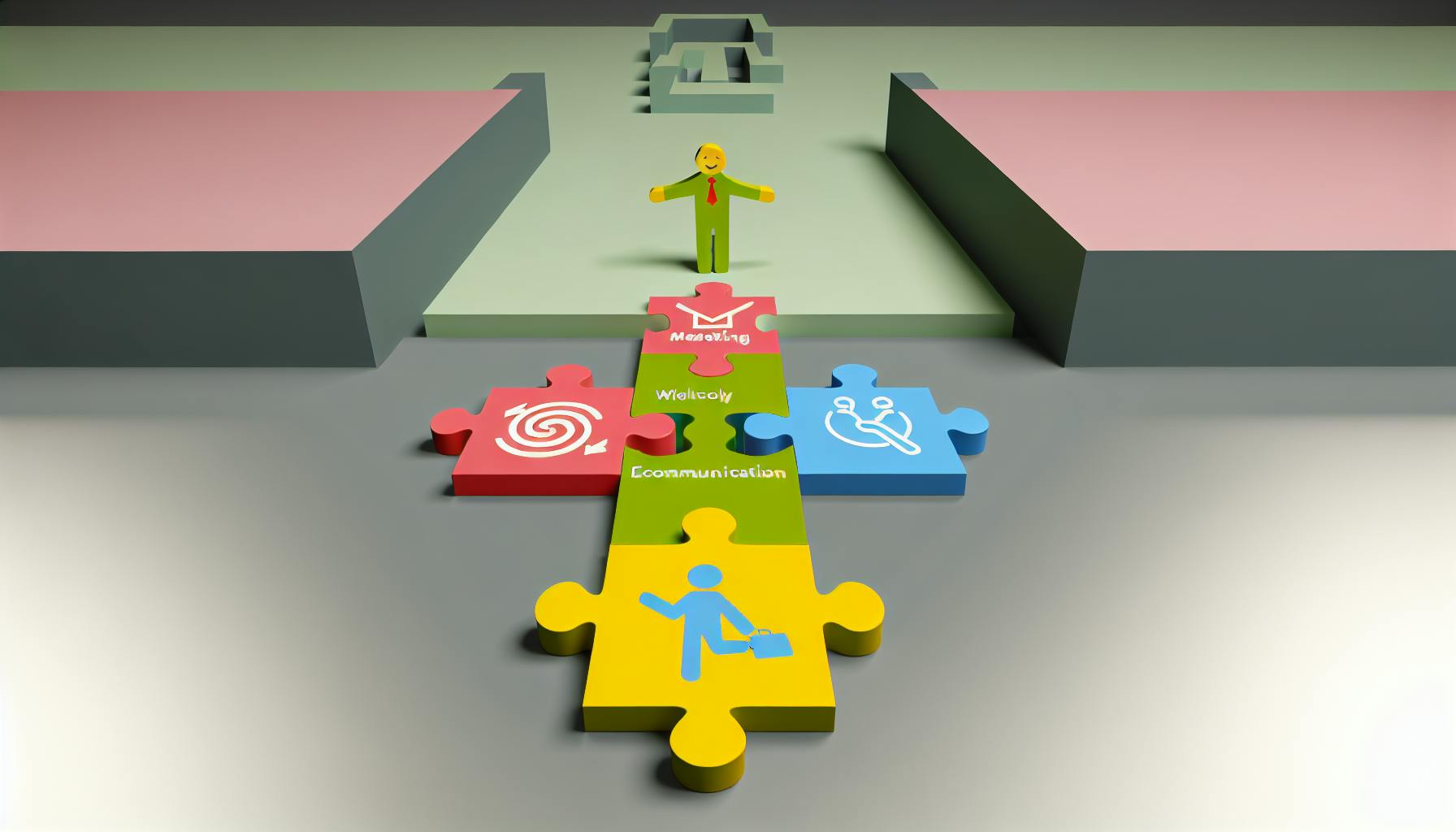Most organizations would agree that a positive work culture is crucial for success in the modern business landscape.
As SaaS companies have embraced remote and hybrid working models, leveraged collaboration tools, and focused on employee empowerment, their work cultures have transformed dramatically.
In this article, we will explore how work culture in SaaS organizations has evolved with recent technological advancements and strategic HR practices. Specifically, we will examine trends like remote work, collaboration tools, employee autonomy, psychological safety, and more.
The Dynamic Transformation of Work Culture in SaaS Organizations
Work culture refers to the shared values, beliefs, attitudes, and behaviors that shape the social environment and employee experience within an organization. As SaaS companies have rapidly evolved, so too has their work culture in order to drive productivity, innovation, and employee engagement.
Understanding Organizational Culture in the SaaS Realm
SaaS companies tend to foster cultures that embrace qualities like:
- Collaboration and transparency
- Embracing remote and hybrid work
- Employee autonomy and flexible schedules
- Diversity, equity, and inclusion initiatives
- Employee growth and development opportunities
These cultural attributes allow SaaS organizations to attract top talent, unlock creativity, move fast, and continually adapt in a highly dynamic industry.
The Importance of Nurturing a Good Work Culture
A positive work culture directly impacts talent retention, employee satisfaction, productivity, and ultimately success. Key reasons why work culture matters:
- Aligns employee values and company vision
- Promotes psychological safety to take risks
- Encourages innovation and progress
- Reduces turnover by increasing employee loyalty
- Boosts recruitment through employer branding
By focusing on work culture, SaaS leaders can gain competitive advantages.
Examining Work Culture Examples and Best Practices
Top SaaS companies leading work culture transformation include:
- GitLab - Fully remote workforce across the globe, asynchronous communication, radical transparency, flexible PTO.
- Stripe - Strong writing culture, peer-to-peer recognition, equal family leave policies.
- Salesforce - Volunteer days, equal pay audits, wellness reimbursement programs.
Their cultures manifest the values of inclusiveness, openness, autonomy and nurturing talent essential for the unique pace of SaaS.
What does a toxic work culture look like?
A toxic work culture can manifest in various ways. Here are some common signs:
Lack of Core Values
- The company lacks clearly defined core values and principles. This creates confusion among employees about priorities, expectations, and alignment on vision.
Unhealthy Competition
- There is often unfriendly competition and gossip between teams or employees. This prevents collaboration and knowledge sharing critical for innovation.
Poor Work-Life Balance
- Employees frequently work late nights and weekends. This is an unsustainable pace that leads to burnout, health issues, and higher turnover.
Lack of Trust
- There is a pervasive lack of trust between leadership and employees. This makes it difficult to have open, transparent communication.
Lack of Accountability
- When mistakes are made, there is often finger-pointing rather than a solution-oriented review. This inhibits risk-taking and responsibility.
Lack of Employee Development
- There are minimal opportunities for learning, growth, and career advancement. This fails to motivate and retain top talent.
Signs of a toxic culture ultimately stem from misalignment between espoused and actual values. It requires proactive leadership to cultivate an ethical, inclusive environment where employees feel fulfilled in their work.
How would you describe your working culture?
SaaS companies have embraced a dynamic, collaborative work culture focused on innovation, agility, and autonomy. Key aspects include:
Remote and Hybrid Work Trends
Many SaaS firms have transitioned to fully remote or hybrid working models. This allows for:
-
Flexibility: Employees can work when and where they are most productive. This improves work-life balance.
-
Wider Talent Pools: Companies can hire the best talent globally without geographic restrictions.
-
Cost Savings: Reduced office space needs cut overhead expenses.
Collaboration Tools
SaaS teams rely on real-time collaboration software like Slack, Zoom, and Notion to communicate and align despite distributed teams. Benefits include:
-
Enhanced Productivity: Teams can work seamlessly together without location barriers.
-
Streamlined Workflows: Collaboration apps help tasks, messages, files, and data flow rapidly between employees.
-
Transparency: Public channels create openness around discussions and information.
Employee Autonomy
SaaS organizations tend to have flat hierarchies that empower employees through:
-
Trust: Employees have flexibility in setting schedules, choosing workflows, and directing projects with minimal oversight.
-
Ownership: Workers feel invested in business outcomes when given responsibility over processes.
-
Creative Freedom: Independence unlocks innovation as employees shape solutions.
This autonomous culture attracts top talent who value working with flexibility and freedom.
In summary, leading SaaS companies have embraced remote and hybrid policies, collaborative digital tools, and employee autonomy to build inclusive, innovative and engaging work cultures where unbounded thinkers thrive. This culture helps them attract talent, move quickly, and lead their industries.
What are examples of culture work?
Examples of cultural works that reflect an organization's values and impact employee experience include:
Company Vision Statement and Core Values
A company's vision statement and clearly defined core values set the tone for organizational culture. For example, a SaaS firm may value innovation, integrity, and customer success. These become cultural pillars that guide decisions and behaviors.
Employee Recognition Programs
Programs that recognize employee achievements tied to core values positively reinforce desired cultural traits. Public praise, rewards, and incentives motivate performance and engagement.
Policies Supporting Work-Life Balance
Flexible remote and hybrid policies, generous time-off allowances, and family leave demonstrate a culture supporting employee wellbeing and work-life balance. These signal the organization values more than productivity.
Diversity, Equity and Inclusion Initiatives
Efforts to promote diversity, equity, inclusion and belonging through hiring practices, ERGs, training, and events cultivate an ethical, socially-conscious culture.
Professional Development Opportunities
Investing in employee learning and development through tuition assistance, skills training, and career pathing promotes growth mindsets and nurtures talent from within.
Fostering a people-centric culture focused on vision, values, balance, belonging, and development leads to positive employee experiences and stronger business performance.
What is the best culture to have at work?
While perks and benefits certainly contribute to employee satisfaction, a positive work culture goes much deeper. It is rooted in open communication, mutual respect, shared goals, and a commitment to employee growth. As organizations increasingly adopt remote and hybrid working models, the following cultural elements become even more critical:
Transparency and Open Communication
- Frequent company-wide updates foster trust and alignment
- Managers should have regular 1-on-1s to check in with reports
- Encourage questions and feedback at all levels
- Provide context around business decisions
Employee Autonomy
- Allow flexibility in working hours and location
- Focus on outcomes rather than time spent on work
- Offer self-service tools to increase efficiency
- Trust employees to organize their own workflows
Learning and Development
- Offer access to continued learning opportunities
- Support participation in conferences and industry events
- Provide budgets for relevant courses and certifications
- Develop mentorship programs to facilitate knowledge sharing
Employee Wellbeing
- Promote healthy work-life integration
- Instate mental health days and encourage using them
- Survey employees regularly to monitor engagement
- Celebrate wins and milestones to boost morale
The key is facilitating trust, communication, empowerment and growth at all levels to shape a culture rooted in respect and focused on enablement. This leads to higher job satisfaction, better retention and stronger business performance.
sbb-itb-34a8e9f
The Rise of Remote Work Trends and Their Impact on SaaS Work Culture
Remote and hybrid working models have become increasingly common in SaaS companies. As technology enables more flexibility in when and where work gets done, organizations have adapted their cultures to support distributed teams. This shift has brought both opportunities and challenges.
Embracing Remote and Hybrid Working Models
Many SaaS companies have moved to partial or fully remote working arrangements:
-
Flexible schedules allow employees to better manage work-life balance. Teams can collaborate despite being in different time zones.
-
A remote-first mindset focuses on clear communication and accountability between employees rather than physical presence.
-
Leaders still need to nurture a sense of trust and community. Virtual social events and asynchronous communication tools help connect distributed employees.
Leveraging Collaboration Tools for Enhanced Productivity
With remote trends, technology plays a crucial role in enabling collaboration. SaaS companies rely on tools like:
- Video conferencing to align distributed teams
- Cloud-based document sharing for real-time collaboration
- Project management software to organize workflows
These solutions support productivity. However, leaders should still promote psychological safety and openness so teams fully leverage these tools.
Creating a Positive Work Culture in a Remote Setting
Fostering an engaging culture remotely requires:
- Encouraging work-life balance through flexible schedules
- Nurturing inclusion with spaces for open dialogue
- Providing autonomy so employees can adapt their workflows
- Recognizing achievements publicly to motivate teams
Ensuring Transparency and Open Communication Across Distances
With distributed teams, information sharing must be proactive. Leaders should:
- Provide context on company goals, values, and decisions
- Give frequent updates to align remote employees
- Actively seek input from all team members
- Overcommunicate through multiple channels
Thoughtful leadership and policies enable SaaS work cultures not just to survive but thrive in a remote world by keeping employees connected, included, and empowered.
Empowering Employees: Autonomy, Engagement, and Development
SaaS companies recognize that empowering employees with autonomy, engaging them, and enabling continuous development are key to nurturing a thriving work culture.
Cultivating Employee Autonomy and Accountability
SaaS organizations encourage accountability and autonomy by:
- Fostering psychological safety so employees feel comfortable taking risks and voicing opinions without fear of negative consequences
- Setting clear goals and priorities while giving teams flexibility in how they accomplish tasks
- Soliciting regular employee feedback and implementing suggested improvements
- Providing the latest collaboration tools and infrastructure for efficient remote work
This autonomy, paired with clear expectations around deliverables, cultivates a culture of trust and accountability. Employees feel motivated to do their best work.
Strategies for High Employee Engagement and Retention
To boost engagement, SaaS companies focus on:
- Recognition programs that allow peer-to-peer rewards and praise for those exemplifying core values
- Comprehensive benefits like flexible time off, work-from-home options, professional development funds, and mental health support
- Inclusive community events that break down boundaries between teams and reinforce wellbeing and diversity & inclusion
These initiatives make the work experience more fulfilling for employees. Retention rates tend to be higher at SaaS firms with such engagement strategies.
Investing in Continuous Learning and Development (L&D)
Continuous L&D in SaaS keeps skills sharp in an ever-evolving landscape. Common programs include:
- Tuition reimbursement for advanced degrees and certifications
- Skills training through online courses, mentorships, job rotations, and stretch assignments
- Leadership development via coaching, workshops, and manager feedback systems
L&D opportunities empower employees to stay competitive and tackle new challenges. This benefits both individual growth and organizational success.
Aligning Core Values with Strategic HR Practices
SaaS companies recognize the importance of integrating their company vision and core values into strategic HR practices to build a strong organizational culture. As remote work becomes more prevalent, clearly articulating and embedding these values across policies and initiatives is crucial.
Infusing Company Vision and Core Values into Culture
A company's vision outlines its purpose and aspirations. Core values define guiding principles for decision-making. By infusing these into culture, SaaS firms create alignment on priorities and foster employee empowerment.
- Clearly communicate the company vision and values across the organization. Repeat them frequently in communications.
- Make values tangible through workplace policies, training programs, and management strategies.
- Encourage employee input on upholding values in their work. Recognize those who exemplify values.
This integration shapes a cohesive culture centered on common beliefs. Workers feel valued and work towards shared goals.
The Role of Strategic HR in Culture Evolution
As strategies adjust to market changes, HR plays a key role in evolving company culture accordingly through:
- Updating workplace policies to support strategic shifts. For example, allowing permanent remote work arrangements.
- Rethinking hiring practices, onboarding, and training to embed updated cultural values across the employee lifecycle.
- Ensuring culture initiatives like DE&I, career development, and recognition programs align with strategic objectives.
This creates an agile culture that can flex with business needs. Employees are equipped to deliver on evolving strategies.
Implementing Diversity and Inclusion as a Cultural Pillar
With remote and global work, diversity and inclusion (DE&I) in culture is now imperative. SaaS companies should:
- Set representation goals. Measure and report on progress towards greater diversity.
- Offer unconscious bias and inclusive leadership training for people managers.
- Build employee resource groups to support underrepresented groups.
- Allow flexibility in work arrangements to support inclusion.
This promotes an equitable and respectful culture where all talent can thrive. DE&I becomes engrained as a cultural asset rather than a one-off initiative.
Reinforcing Culture through Recognition, Compensation, and Benefits
SaaS companies can reinforce a positive, high-performance culture by implementing employee recognition programs, ensuring fair compensation, and providing competitive benefits packages. These initiatives demonstrate that the organization values its employees and wants to support their wellbeing.
Designing Effective Employee Recognition Programs
- Recognition programs boost morale by making employees feel valued and appreciated. This leads to higher engagement and performance.
- SaaS companies should tailor recognition to reinforce behaviors and achievements tied to core values. This integrates culture into the rewards system.
- Recognition can be formal (rewards, shout-outs) or informal (peer-to-peer appreciation). Both are impactful.
- Digital tools like Slack integrations, peer recognition platforms, and pulse surveys make recognition easy to implement in distributed teams.
Aligning Compensation with Organizational Values
- Compensation should align with an organization's cultural values around equity, transparency, and appreciation of top talent.
- SaaS companies should ensure pay equity through compensation analysis. This reflects a commitment to fairness.
- Transparent compensation frameworks and clearly-communicated raises/bonuses demonstrate that the company values openness.
Benefits Packages that Support Wellbeing and Work-Life Balance
- Comprehensive benefits like flexible schedules, paid time off, mental health support, and learning stipends enable work-life balance.
- These offerings demonstrate that the organization cares about employee wellbeing and development.
- SaaS companies should tailor benefits to support remote and hybrid workers' evolving needs. Offerings like virtual health services and home office stipends provide this flexibility.
In summary, SaaS organizations can profoundly shape culture through programs that recognize, compensate, and support employees. By tying these initiatives to cultural values around equity, transparency, flexibility and wellbeing, they powerfully reinforce the employee experience.
Cultivating Psychological Safety and Trust within Teams
Psychological safety and trust are critical components of a positive work culture, especially for SaaS companies that rely on innovation, collaboration, and autonomy.
Building a Foundation of Trust and Open Dialogue
-
Leaders should focus on building relationships, listening without judgement, and encouraging respectful debate of ideas. This creates a sense of trust between team members.
-
Frequent team check-ins allow for open and transparent communication. Employees feel comfortable sharing concerns, giving feedback, and voicing creative concepts without fear of negative consequences.
-
SaaS tools like Slack, Microsoft Teams, and Zoom facilitate constant communication and collaboration across remote teams. This strengthens connections.
The Impact of Psychological Safety on Employee Performance
-
When employees feel psychologically safe, they are more likely to take smart risks, share new ideas openly, and drive innovation. This leads to better products and services.
-
Granting autonomy over how work gets done also boosts motivation and productivity. Employees feel trusted and accountable.
-
Data shows that psychologically safe and engaged teams demonstrate higher revenue growth, better talent retention, and increased client satisfaction.
Encouraging Risk-Taking and Innovation through Safety
-
Leaders should encourage experimentation by allowing employees to allocate a percentage of their time to passion projects. This sparks creativity.
-
Innovation contests, hackathons, and rewards programs incentivize developers and engineers to collaboratively ideate groundbreaking features.
-
Calculated risks that don't succeed should be viewed as learning opportunities rather than failures. This promotes continual improvement.
Fostering psychological safety and trust enables the high-performance culture critical for SaaS companies to thrive in a rapidly evolving landscape.
Conclusion: Synthesizing the Evolution of SaaS Work Culture
Recapitulating the Shift in Work Culture Dynamics
The modern SaaS work culture has undergone a significant transformation, shaped by trends like remote work, collaboration tools, and employee autonomy. Key changes include:
- Remote and hybrid work models becoming the norm, with flexible schedules and location options
- New collaboration tools like Slack, Notion, and Miro enabling seamless teamwork across distances
- Increased employee autonomy through flexible schedules, asynchronous communication, and results-focused management
These developments have created a work culture centered around trust, transparency, and empowerment.
Essential Elements for a Sustainable and Adaptive Culture
To sustain a dynamic, future-ready culture, SaaS companies should focus on:
- Diversity and inclusion initiatives to tap wider talent pools and perspectives
- Employee wellbeing through time off, mental health support, and work-life balance
- Continuous learning via L&D programs, mentorships, and growth opportunities
- Open communication with regular employee feedback and townhalls
- Mission and values alignment so employees feel connected to company goals
By integrating these elements, SaaS organizations can better attract, engage, and retain talent while adapting to ongoing changes.
Looking Ahead: The Future of Work Culture in SaaS
As remote and hybrid setups become standardized, work cultures will continue evolving, with an emphasis on flexibility, transparency, and diversity.
Staying ahead of the curve, SaaS companies should look to:
- Test and adopt new technologies that streamline collaboration
- Listen to employees frequently to meet changing needs
- Benchmark against industry leaders in people practices
- Iteratively improve with regular cultural assessments
By taking a proactive and employee-centric approach, SaaS players can build a resilient culture poised for the future of work.


